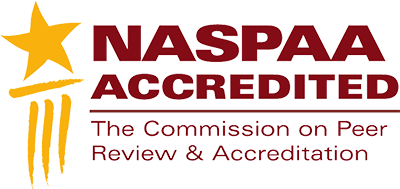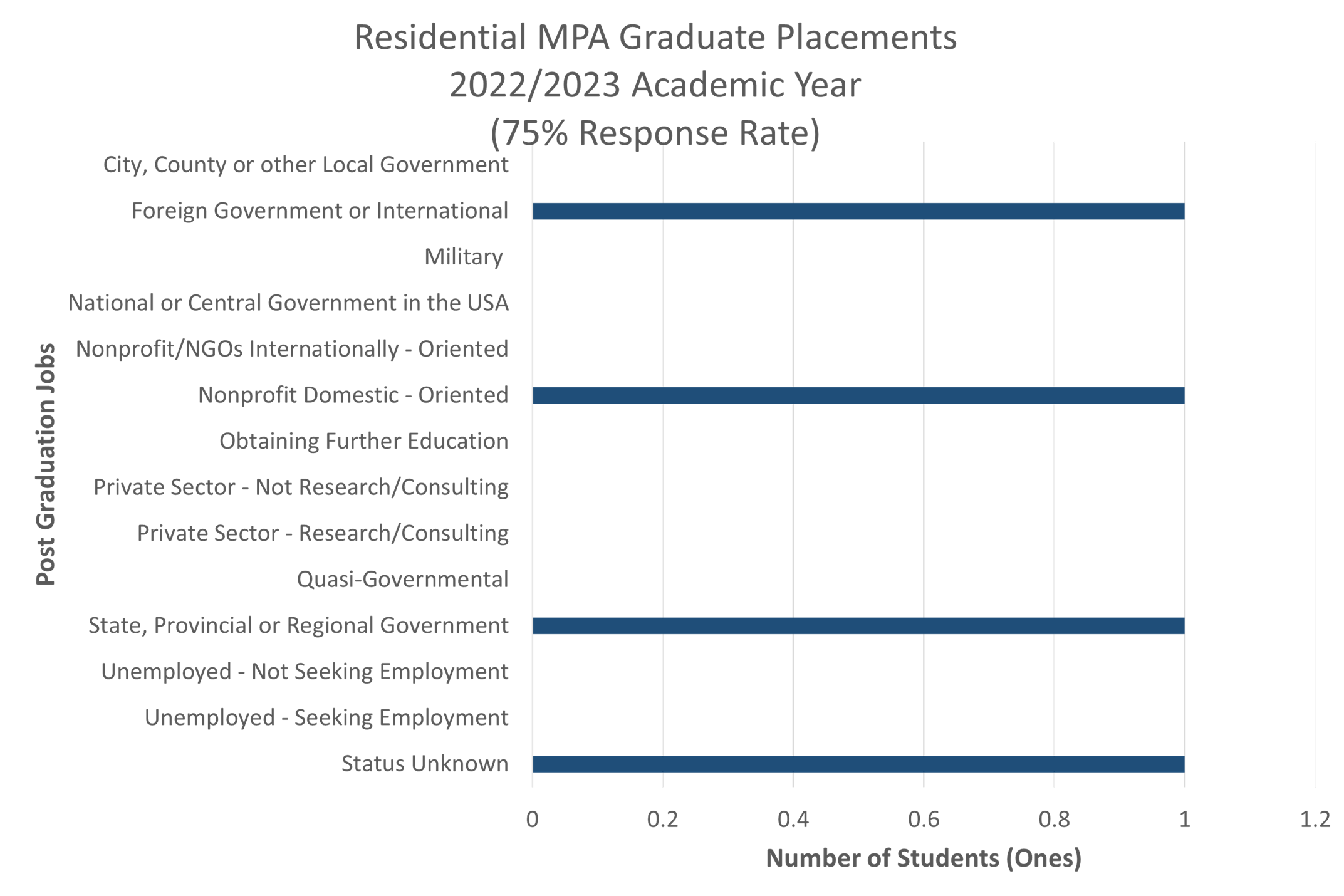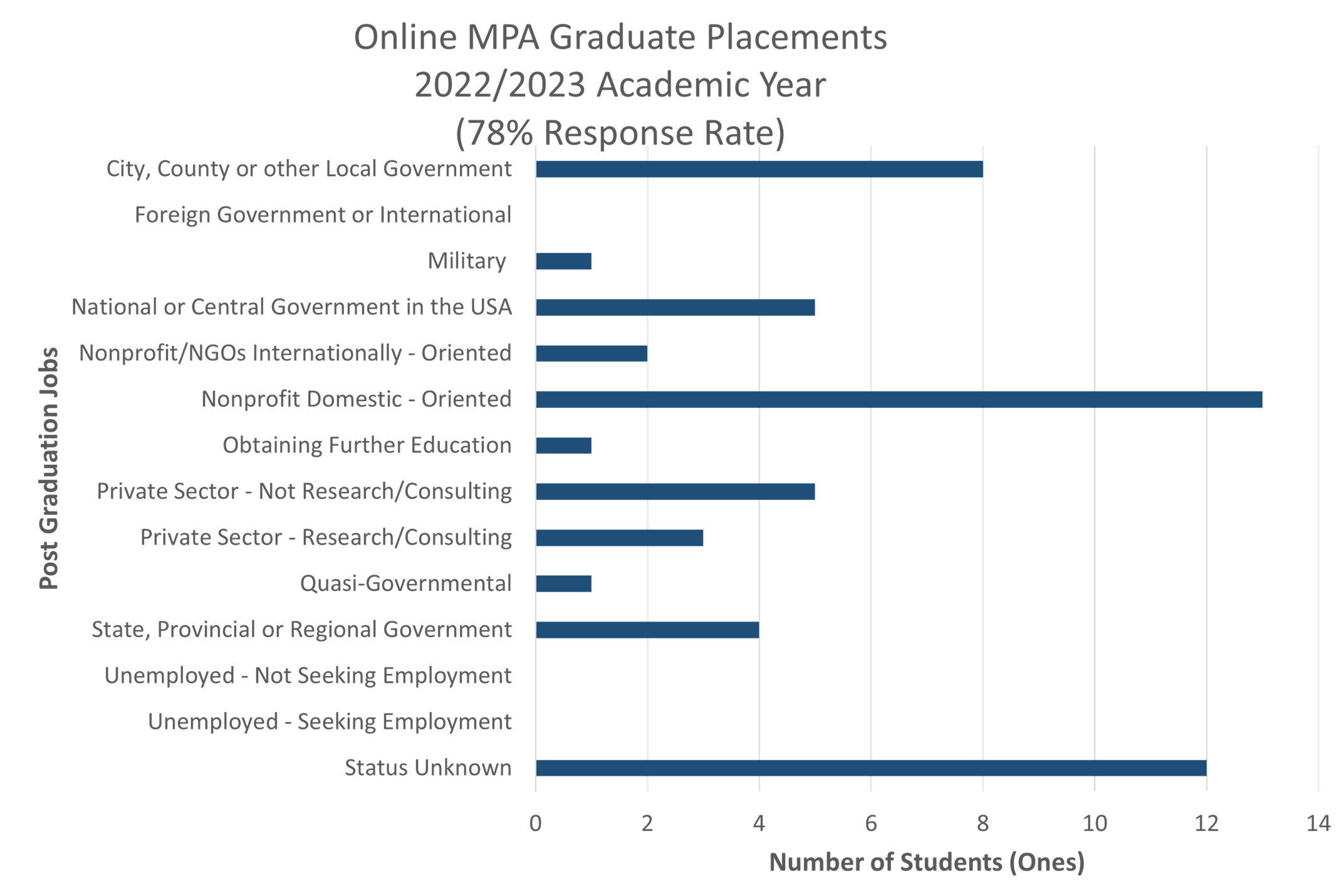Application deadline
Credits and costs
Nationally Recognized

Gain Skills to Become an Industry Leader in Public Administration
Gain the leadership competencies required to become an effective and flexible leader.
Enhance your ability to understand, analyze, and control your organizational environment.
Learn how to manage and promote positive change in the public and nonprofit sectors.
Analyze and evaluate public policies.
Develop in-demand administration skills to work in an increasingly diverse world.
Apply analytical methods to interpret economic, political, and societal dynamics.
Hone decision-making and problem-solving to find solutions to challenging issues.
Courses to Expand Your Practical Knowledge
Courses to Expand Your Practical Knowledge
In addition to blending theoretical and applied concepts, the curriculum in this online program covers organizational governance, finance, and administration while providing real-world experiences for the novice administrator. It also incorporates an internship and a capstone research project to give you the opportunity to hone your skills in the field.
Areas of study include:
- nonprofit management
- policy analysis and evaluation
- public budgeting and financial management
- state/local government and administration
- homeland security
Master of Public Administration Degree Program Requirements
39 graduate credits (3 credits per course), which includes:
- 21 credits in core courses
- 12 credits in electives
- 3 credits for a capstone course
- 3-credit internship
The range of the core courses is balanced in the areas of managing organizations, making evidence-informed decisions, analyzing policy, and applying analytical methods to understand the dynamics of economic, organizational, political, and societal environments.
The elective course selections can be customized based on the students’ interests, including human resources, nonprofit management, policy analytics and evaluation, public budgeting and financial management, and state-local government and administration.
The capstone course offers students the opportunity to demonstrate competencies in problem identification, problem-solving, professional writing, oral presentation, group research, and presentation skills.
A 3-credit/150-hour internship is required of students who do not have at least two years of full-time relevant work experience that consists of supervisory, managerial, or professional work relevant to serving the public and nonprofit organizations. The internship is waived for students with this experience before they enter the program or who gain it by working full-time or part-time during their enrollment in the program. If this occurs, students must apply for the internship waiver.
Core Courses (21 credits)
- 3credits
Nature, function, and technique of governmental budgeting viewed as mechanism for allocating resources among alternative public uses.
- 3credits
Examination of research methodologies relevant to administration, planning, and public policy.
- 3credits
Conduct independent research in policy analysis, program evaluation, and public management.
- 3credits
Concepts and approaches contributing to effective use of human resources in public and nonprofit organizations; legal issues and requirements.
- 3credits
Introduction to the analysis of public policy within its organizational and political contexts, including an emphasis on an economic perspective.
- 3credits
Examination of concepts of human behavior in formal organizations, systems analysis, conceptual models, and decision processes.
- 3credits
Development of basic concepts and issues in public administration; administrative theory and public policy processes.
Capstone Course (3 credits)
- 3credits
Supervised student activities on research projects identified on an individual or small-group basis.
- Prerequisite
PADM 503
Internship (3 credits)
- 3credits
Supervised off-campus, nongroup instruction, including field experiences, practicums, or internships. Written and oral critique of activity required.
- Prerequisite
PADM 503
- Note
Required for students who have less than two years of relevant work experience.
Elective Courses (select 12 credits)
- 3credits
Theory of organizational change and development; case analysis of applications in actual situations.
- Prerequisite
HADM 510 or PADM 510
- 3credits
A survey of strategic planning purposes, approaches and methods, and expected outcomes in small and large organizations.
- 3credits
A study of the theoretical and practical issues involved in management and leadership of nonprofit organizations.
- 3credits
This course will examine theory, strategies, and practices for securing and managing resources for a nonprofit organization. The course will be offered every third semester.
- 3credits
This course is designed to enhance students’ ability to develop and use performance measurement systems in the public sector.
- Prerequisite
PADM 800
- 3credits
Theories and techniques of financial planning and control, with emphasis on their application in government and nonprofit agencies.
- Prerequisite
PADM 502
- 3credits
Accounting, reporting, and auditing principles and procedures for public sector agencies and nonprofit organizations.
- Prerequisite
PADM 502
- 3credits
The course covers the essential concepts of planning for the response to all hazards incidents.
- Prerequisite
HLS 811
Note: Students may customize a focus area by choosing courses that are of special interest to their career. Focus areas are not required and will not appear on a transcript but may be noted on a résumé.
Course Availability
If you're ready to see when your courses will be offered, visit our public LionPATH course search (opens in new window) to start planning ahead.
Career Opportunities and Resources

Career Opportunities and Resources
Nearly every aspect of our lives in our communities has been influenced by a public administrator. You can use the knowledge gained from this program and the support of Penn State career resources to pursue careers in a variety of fields, depending on your goals.
Job Titles Related to This Degree
An MPA can create opportunities for leadership roles in government and nonprofit organizations and policy-related positions in the private sector. For those interested in public service, an MPA offers the expertise needed to excel in diverse, impactful roles, from public budgeting to policy analysis.
The following roles are often held by people with this type of degree:
- Budget Officer
- Development Director
- Nonprofit Director
- Public Affairs Director
- Public Works Director
- Social Services Director
Employment Outlook for Occupational Fields Related to This Degree
Estimates of employment growth and total employment are provided by the U.S. Bureau of Labor Statistics and are subject to change. While these occupations are often pursued by graduates with this degree, individual outcomes may vary depending on a variety of factors. Penn State World Campus cannot guarantee employment in a given occupation.
General and Operations Managers
Social and Community Service Managers
Public Relations Managers
Fundraising Managers
Career Services to Set You Up for Success

From the day you're accepted as a student, you can access resources and tools provided by Penn State World Campus Career Services to further your career. These resources are beneficial whether you're searching for a job or advancing in an established career.
- Opportunities to connect with employers
- Career counselor/coach support
- Occupation and salary information
- Internships
- Graduate school resources
Ready to Learn More?
Get the resources you need to make informed decisions about your education. Request information on this program and other programs of interest by completing this form.
Ready to take the next step toward your Penn State master's degree?
Costs and Financial Aid
Costs and Financial Aid
Learn about this program's tuition, fees, scholarship opportunities, grants, payment options, and military benefits.
Costs and Financial Aid
Graduate Tuition
Graduate tuition is calculated based on the number of credits for which you register. Tuition is due shortly after each semester begins and rates are assessed every semester of enrollment.
2025–26 Academic Year Rates
| How many credits do you plan to take per semester? | Cost |
|---|---|
| 11 or fewer | $1,037 per credit |
| 12 or more | $12,448 per semester |
Financial Aid and Military Benefits
Some students may qualify for financial aid. Take the time to research financial aid, scholarships, and payment options as you prepare to apply. Federal financial aid may only be used to pay for credits used to satisfy program requirements.
Military service members, veterans, and their spouses or dependents should explore these potential military education benefits and financial aid opportunities, as well.
Additional Cost of Attendance Details
To view the detailed list of cost of attendance elements:
- visit the Tuition Information site
- click the plus sign to expand the table
- select a semester from the World Campus row
Technical Requirements
Review the technical requirements for this program.
Earn a Valuable Credential along the Way

Earn a Valuable Credential along the Way
You may also apply for one of the graduate certificates in public administration offered online. Courses in the certificates are also part of the master's program, allowing you the flexibility to earn both at the same time — if you apply and are granted admission.
Certificate Programs Related to This Degree
The following certificates can be earned while completing this public administration program:
Gain an understanding of homeland security issues that apply at all levels of government and national security, as well as in the private sector, with this online homeland security certificate program.
Learn more about the Graduate Certificate in Homeland SecurityDevelop the skills needed to plan and manage budgets and financial systems. This online graduate certificate program is a good fit for administrators and financial professionals at government and nonprofit organizations.
Learn more about the Graduate Certificate in Public Budgeting and Financial ManagementPrepare for mid- and upper-level human resources or employment relations positions in the public and private sectors. This certificate can provide you with core skills in personnel management, labor relations, problem-solving, planning, and management of organizational change and development.
Learn more about the Graduate Certificate in Public Sector Human Resources ManagementJoin a NASPAA-Recognized Program of Study
Join a NASPAA-Recognized Program of Study
A master’s degree in public administration is the accepted professional credential for public service professionals who are looking for marketability and opportunities for advancement. The MPA program is accredited by the Network of Schools of Public Policy, Affairs, and Administration (NASPAA), the recognized global accreditor of master's degree programs in public policy, affairs, and administration.
NASPAA–Accredited Public Administration Programming from the Penn State Harrisburg School of Public Affairs
NASPAA's mission is to ensure excellence in education and training for public service and to promote the ideal of public service.
Number of Students
As of the fall semester 2021, there were 166 students enrolled in the MPA program (12 on campus and 154 online).
Time to Graduation
For the class which began in 2017–2018, 53% of HB students and 31% of WC students graduated in two years and 86% of HB students and 69% of WC students graduated in four years.
Completion Rates, Academic Year 2017–18
| Modality | Initially Enrolled | Graduated within 2 years | Graduated within 4 years |
|---|---|---|---|
| Residential | 15 students | 53% | 86% |
| Online | 115 students | 31% | 69% |
Employment of Graduates
Graduates of our resident MPA program most often find employment within local or regional government, domestic-oriented nonprofits, and the private sector (non-research). Graduates of the online program are most often employed in national and local/regional government, the private sector, and domestic-oriented nonprofits.

Residential MPA Graduate Placements 2022–2023 Academic Year (75% Response Rate)
| Job Placement | Number of students |
|---|---|
| City, County, or other Local Government | 0 |
| Foreign Government or International | 1 |
| Military | 0 |
| National or Central Government in the USA | 0 |
| Nonprofit/NGOs Internationally Oriented | 0 |
| Nonprofit Domestic-Oriented | 1 |
| Obtaining Further Education | 0 |
| Private Sector — Not Research/Consulting | 0 |
| Private Sector — Research/Consulting | 0 |
| Quasi–Governmental | 0 |
| State, Provincial, or Regional Government | 1 |
| Unemployed — Not Seeking Employment | 0 |
| Unemployed — Seeking Employment | 0 |
| Status Unknown | 1 |
| Total Graduated | 4 |

Online MPA Graduate Placements 2022–2023 Academic Year (78% Response Rate)
| Job Placement | Number of students |
|---|---|
| City, County, or other Local Government | 8 |
| Foreign or International Government | 0 |
| Military | 1 |
| National or Central Government in the USA | 5 |
| Nonprofit/NGOs Internationally Oriented | 2 |
| Nonprofit Domestic–Oriented | 13 |
| Obtaining Further Education | 1 |
| Private Sector — Not Research/Consulting | 5 |
| Private Sector — Research/Consulting | 3 |
| Quasi-Governmental | 1 |
| State, Provincial, or Regional Government | 4 |
| Unemployed — Not Seeking Employment | 0 |
| Unemployed — Seeking Employment | 0 |
| Status Unknown | 12 |
| Total Graduated | 55 |
Internships
Students who do not have two years of relevant employment experience must enroll in P ADM 595: Internship. This course requires 150 hours of service. Examples of our students' internship placements in the past two years include:
City of University Park/Town of Highland Park, Texas
Tompkins County Planning Department, New York
Georgia Shift, Georgia
American Red Cross, Colorado
Department of Defense – Defense Logistics Agency, Pennsylvania
Tioga County Department of Probation and Parole, Pennsylvania
Student Services
Penn State has a variety of services available to ensure that students are receiving the necessary support throughout their higher education journey. Once admitted into the program, Public Administration students will have access to the MPA Administrative Support and Student Success Assistant, in addition to many other avenues for support.
Who Should Apply?
Who Should Apply?
If you are interested in a career in government, public management, policy process, health and human services, or other public or nonprofit organizations and want to make an impact on the issues and problems that affect the general public, this could be the program for you.
An MPA is an excellent choice for those drawn to public service or the nonprofit sector. By earning an MPA, you can acquire a thorough understanding of critical areas such as public budgeting, organizational behavior, and human resources management. This degree suits a range of backgrounds because public administration is a diverse field that requires a mix of analytical and managerial skills. No matter your undergraduate degree, our MPA program can build upon your past education and experience and prepare you to take on roles as a leader or an administrator in the public sector.
When Does an MPA Make More Sense than a Master of Public Policy (MPP)?
When it comes to choosing your path, consider that while there is some initial overlap in MPA and MPP curriculum, the learning outcomes separate more the further you advance in either program. Career outcomes for an MPA include nonprofit managers, business administrators, government relations specialists, and chiefs of staff. Career outcomes for an MPP include researchers, analysts, and strategists, as well as government relations managers. Choose the degree that most closely aligns with your career aspirations.
Set Your Own Pace

Set Your Own Pace
Whether you are looking to finish your program as quickly as possible or balance your studies with your busy life, Penn State World Campus can help you achieve your education goals. Many students take one or two courses per semester.
The typical student course load is expected to be three to four courses per year. At this rate, the MPA degree program can be completed in three to five years of study.
Convenient Online Format
This program's convenient online format gives you the flexibility you need to study around your busy schedule. You can skip the lengthy commute without sacrificing the quality of your education and prepare yourself for more rewarding career opportunities without leaving your home.
A Trusted Leader in Online Education

Penn State has a history of more than 100 years of distance education, and World Campus has been a leader in online learning for more than two decades. Our online learning environment offers the same quality education that our students experience on campus.
Information for Military and Veterans

Are you a member of the military, a veteran, or a military spouse? Please visit our military website for additional information regarding financial aid, transfer credits, and application instructions.
How to Apply to Penn State

How to Apply to Penn State
Apply by December 1 to start January 12
Application Instructions
Deadlines and Important Dates
Complete your application and submit all required materials by the appropriate deadline. Your deadline will depend on the semester you plan to start your courses.
Spring Deadline
Apply by December 1 to start January 12Summer Deadline
Apply by February 1 to start May 18Fall Deadline
Apply by July 15, 2026, to start August 24, 2026
Applicants will be notified of a decision within 30 days after the deadline. You may apply several months in advance and indicate your planned semester start date in the application.
Steps to Apply
For admission to the J. Jeffrey and Ann Marie Fox Graduate School, an applicant must hold either (1) a baccalaureate degree from a regionally accredited U.S. institution or (2) a tertiary (postsecondary) degree that is deemed comparable to a four-year bachelor's degree from a regionally accredited U.S. institution. This degree must be from an officially recognized degree-granting institution in the country in which it operates.
GPA — Postsecondary (undergraduate), junior/senior (last two years) GPA is required.
You will need to upload the following items as part of your application:
Official transcripts from each institution attended, regardless of the number of credits or semesters completed. Transcripts not in English must be accompanied by a certified translation. If you are a Penn State alum, you do not need to request transcripts for credits earned at Penn State but must list Penn State as part of your academic history.
Test Scores — GRE or GMAT scores are only required if GPA is less than 3.0.
English Proficiency — The language of instruction at Penn State is English. With some exceptions, international applicants must take and submit scores for the Test of English as a Foreign Language (TOEFL) or International English Language Testing System (IELTS). Minimum test scores and exceptions are found in the English Proficiency section on the Fox Graduate School's "Requirements for Graduate Admission" page. Visit the TOEFL website for testing information. Penn State's institutional code is 2660.
References (3) — You will need to initiate the process through the online application by entering names, email addresses, and mailing addresses of three references. Upon submission of your application, an email will be sent to each reference requesting they complete a brief online recommendation regarding your commitment for success in an online program. Please inform all recommenders they must submit the form in order for your application to be complete.
Program-Specific Questions/Materials
Résumé — Upload your résumé (one-to two-pages) to the online application.
Personal Statement — One to two pages of career and educational goals.
To begin the online application, you will need a Penn State account.
Create a New Penn State Account
If you have any problems during this process, contact an admissions counselor at [email protected].
Please note: Former Penn State students may not need to complete the admissions application or create a new Penn State account. Please visit our Returning Students page for instructions.
You can begin your online application at any time. Your progress within the online application system will be saved as you go, allowing you to return at any point as you gather additional information and required materials.
- Choose Enrollment Type: "Degree Admission"
- Choose "WORLD CAMPUS" as the campus
Checking Your Status
You can check the status of your application by using the same login information established for the online application form.5. Complete the application.
Admissions Help
If you have questions about the admissions process, contact an admissions counselor at [email protected].
Contact Us

Contact Us
Have questions or want more information? We're happy to talk.
To learn more about the Master of Public Administration, please contact:
World Campus Admissions Counselors
Phone: 814-863-5386
Email: [email protected]
For MPA program information, please contact:
Autumn Wise
Penn State Harrisburg
School of Public Affairs
Phone: 717-948-6773
Email: [email protected]
Learn from the Best
Learn from the Best
Penn State Harrisburg's School of Public Affairs has partnered with Penn State World Campus to deliver their on-campus Master of Public Administration program to adult learners who need the flexibility and convenience of studying online. Your classes are taught by the same instructors who teach this program on campus, giving you access to the same expertise and high-quality courses in an engaging environment that promotes success at a distance.
Faculty
Jane Beckett-Camarata
- DegreePh.D., Virginia Commonwealth University
- DegreeM.P.A., American University
- DegreeB.S., Business Administration, Syracuse University
Dr. Jane Beckett-Camarata teaches such master's courses as Governmental and Nonprofit Financial Management, Governmental and Nonprofit Accounting and Reporting, Budgeting, and the MPA Capstone. She has extensive previous experience as a state government financial manager and researcher. She researches and publishes in the areas of state and local government fiscal stress, debt management, operating budget volatility and debt management, bankruptcy, type and timeliness of local government financial reporting, capital budgeting and infrastructure finance, and intergovernmental transfers.
Younhee Kim
DegreePh.D., Public Administration, Rutgers University-NewarkDr. Younhee Kim is an associate professor of public administration in the School of Public Affairs at Penn State Harrisburg. Her research interests are in the broad areas of public and performance management, focusing on performance measurement, public entrepreneurship, information technology and e-governance, and citizen participation. Her recent work has appeared in numerous journals and edited books. Dr. Kim has taught various courses, such as Public Policy Analysis, Strategic Planning, Intergovernmental Relations, Public Information Technology, State Government, and Organizational Development.
Daniel J. Mallinson
- DegreePh.D., Political Science, Penn State
- DegreeM.A., Political Science, Villanova University
- DegreeB.A., Political Science, Elizabethtown College
Dr. Daniel J. Mallinson is an associate professor of public policy and administration in the School of Public Affairs at Penn State Harrisburg. His research interests focus on state and local politics and policy, with specific experience in policy diffusion, agenda setting, federalism, environmental policy, and drug policy. He teaches courses on public policy analysis, state government administration, and research methods.
Goktug Morcol
- DegreePh.D., Public Administration, Virginia Tech
- DegreeM.S., Political Science and Public Administration, Middle East Technical University
- DegreeB.S., Sociology, Middle East Technical University
Dr. Goktug Morcol is a professor of public policy and administration. He has authored, edited, and co-edited seven books. His articles have appeared in Public Administration Review, Administration & Society, Administrative Theory & Praxis, Policy Sciences, Journal of Urban Affairs, and others. He served as the first chair of the Section on Complexity and Network Studies of the American Society for Public Administration. He is editor-in-chief of Complexity, Governance & Networks.
Bing Ran
DegreePh.D., Management Sciences, University of WaterlooDr. Bing Ran is a professor of public administration in the School of Public Affairs at Penn State Harrisburg. His research interests focus on areas that include collaborative governance networks, social entrepreneurship and hybrid organizations, knowledge management and integration, and organizational identity and image. He teaches such courses as PADM 505, 510, 511, and 571, and he serves as professor-in-charge for the Graduate Certificate in Public Sector Human Resources Management.
Glenn Silverstein
- DegreePh.D., University of Delaware
- DegreeMBA, University of Delaware
- DegreeM.A., University of Delaware
Dr. Glenn Silverstein's primary teaching assignments include the introductory graduate survey course for public administration and human resource management. He also teaches courses on leadership and ethics. His research interests include leadership in the public sector, public sector pedagogy and teaching methodologies, and public sector ethics.
Odd J. Stalebrink
- DegreePh.D., School of Public Policy, George Mason University
- DegreeM.Sc., Business Administration (finance), Jönköping International Business School, Sweden
- DegreeB.Sc., Business administration (accounting), Jönköping International Business School, Sweden
Dr. Odd J. Stalebrink's research and teaching specializations are in the areas of public budgeting and financial management. His scholarly work has appeared in numerous peer-reviewed journals including, but not limited to, Financial Accountability & Management, Critical Perspectives on Accounting, Journal of Public Budgeting Accounting & Financial Management, Accounting Forum, The American Review of Public Administration, Transportation Research Part A: Policy and Practice, International Journal of Technology, Policy and Management, and Public Budgeting & Finance.
Michele Tantardini
- DegreePh.D., Public Affairs, Florida International University
- DegreeM.Sc., Management of Public Administrations and International Institutions, Bocconi University
Dr. Michele Tantardini is an associate professor of public administration at the Penn State Harrisburg School of Public Affairs. He earned his doctorate focusing his studies and research on the relationship between performance information use and organizational social capital. His current research agenda focuses on three main topics: performance management, social capital, and public service motivation. His teaching interests are in performance management, organizational theory and behavior, and human resource management.
Triparna Vasavada
- DegreePh.D., Public Administration, SUNY Albany
- DegreeM.P.A., SUNY Albany
- DegreeM.A., Economics, Gujarat University, India
- DegreeB.A., Economics, Gujarat University, India
Dr. Triparna Vasavada is an associate professor of public administration. Her research interests are nonprofit management, gender and leadership, and social network analysis. She teaches research methods and nonprofit management courses. Her work has appeared in American Review of Public Administration, Administration & Society, and Public Management Review. She has presented papers at conferences, including the American Society for Public Administration, International Society of Third-Sector Research, and Association for Research on Nonprofit Organizations and Voluntary Action.
